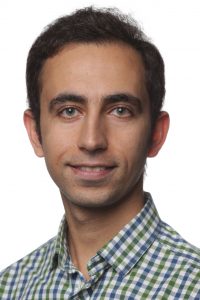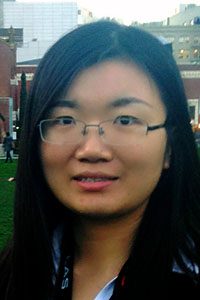
Novel photonic resonant arrangements using non-Hermitian Exceptional Points
In recent years, non-Hermitian degeneracies, also known as exceptional points (EPs), have emerged as a new paradigm for engineering the response of optical systems. Among many different non-conservative photonic configurations, parity-time (PT) symmetric arrangements are of particular interest since they provide an excellent platform to explore the physics of exceptional points. In this talk, I will show how the intriguing properties of exceptional points that are arising in judiciously designed parity-time-symmetric systems can be utilized to address two of the long standing challenges in the field of integrated photonics: enforcing single mode lasing in intrinsically multimode cavities, and enhancing sensitivity of micro-resonators.
Hossein Hodaei is a PhD student in Dr. Khajavikhan’s Plasmonics and Applied Quantum Optics (PAQO) Group. His research is focused on novel semiconductor lasers and non-Hermitian optics. He has published 6 first-authored journal papers and coauthored 9 additional journal papers. He has also presented his research in prominent conferences in optics like CLEO and SPIE Photonic West.
Runners-up

Low-loss and fast-response liquid crystals for infrared applications
In addition to displays, liquid crystal (LC) is also a strong contender for infrared (IR) photonic devices, such as adaptive optics, laser beam steering, and dynamic scene projectors. The major challenges for IR LC devices are twofold: large absorption loss and relatively slow response time. In the IR region, several fundamental molecular vibration bands and overtones exist, which contribute to high absorption loss. The absorbed light turns to heat and then alters the birefringence, which in turns causes spatially nonuniform phase modulation. In this talk, I will describe the molecular engineering processes leading to the development of new low loss chlorinated LC mixtures in the mid-wave infrared (MWIR) region. The transmittance is >98% with 2? phase change. Meanwhile, by forming polymer network, I have demonstrated a MWIR phase modulator with response time 100x faster than that using a conventional nematic LC.
Fenglin Peng is currently a PhD student in Prof. Shin-Tson Wu’s research group. She received her B.S degree in Optical Engineering from Zhejiang University in 2012. Her research mainly focus on novel liquid crystal materials and devices for display and photonics applications. Fenglin received SPIE Optics and Photonics Education Scholarship in 2016. She has published one book chapter, 26 journal papers and 18 conference proceedings.

New Manifestations of Mesoscopic Interactions in Complex Media
Mesoscale optics defines a framework for understanding a wide range of interactions in fields as diverse as biological tissues, optical coatings, colloidal and polymer fluids, fabricated nanostructures, etc. When light interacts with such complex systems, the outcome depends strongly on the length and time scales of the interaction. Mesoscale optics offers a framework for understanding manifestations of wave phenomena such as interference and phase memory in complex media. Approaches specific to mesoscale optics provide the necessary quantitative descriptions that neither microscopic nor macroscopic models of light-matter interaction can offer.
In this talk I will present a brief survey of fundamental concepts, approaches, and techniques specific to light-matter interaction at mesoscopic scales. I will then introduce a novel approach for analyzing particular aspects of light propagation in dense composite media and I will provide evidence that the wave nature of light can be critical for understanding its propagation in unbounded, highly scattering materials. The talk will demonstrate that the perceived diffusion of light is actually subject to competing mechanisms of interaction that lead to qualitatively different phases for the light evolution through complex media. Finally, I will discuss implications for the ever elusive localization of light in three-dimensional random media.
Roxana Rezvani Naraghi is currently a PhD student in Dr. Dogariu’s group. She received her B.Sc. in Condensed Matter Physics, and M.Sc. in Atomic, Molecular and Optical Physics from University of Tehran in 2009 and 2012, respectively. She also received a M.Sc. in Optics and Photonics from University of Central Florida in 2015. Her research is focused on using statistical optics to quantify properties of complex media, develop non-invasive sensing techniques, and design photonic structures with unique scattering features. She has authored and coauthored 29 publications in refereed journal papers, conference proceedings and patents.